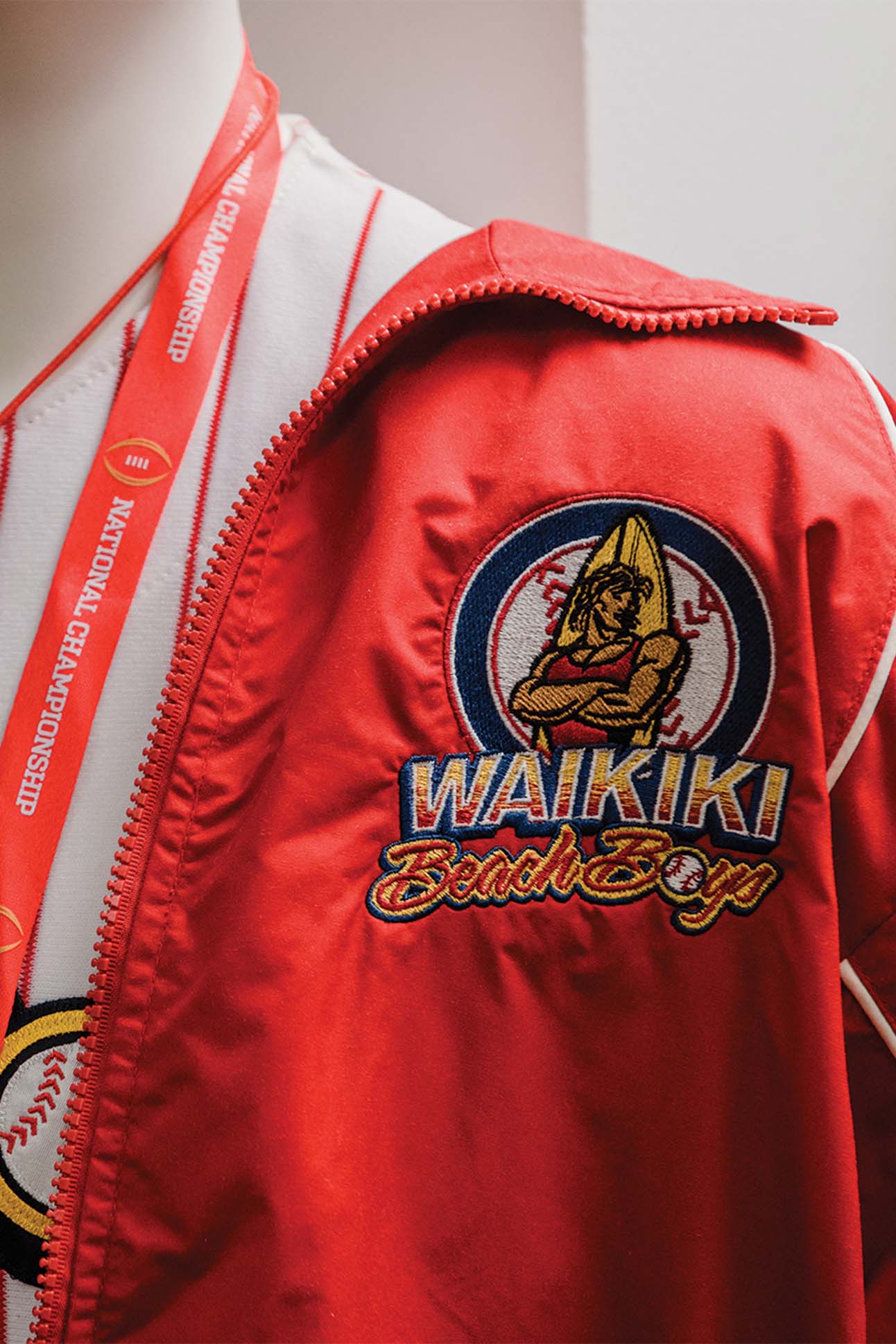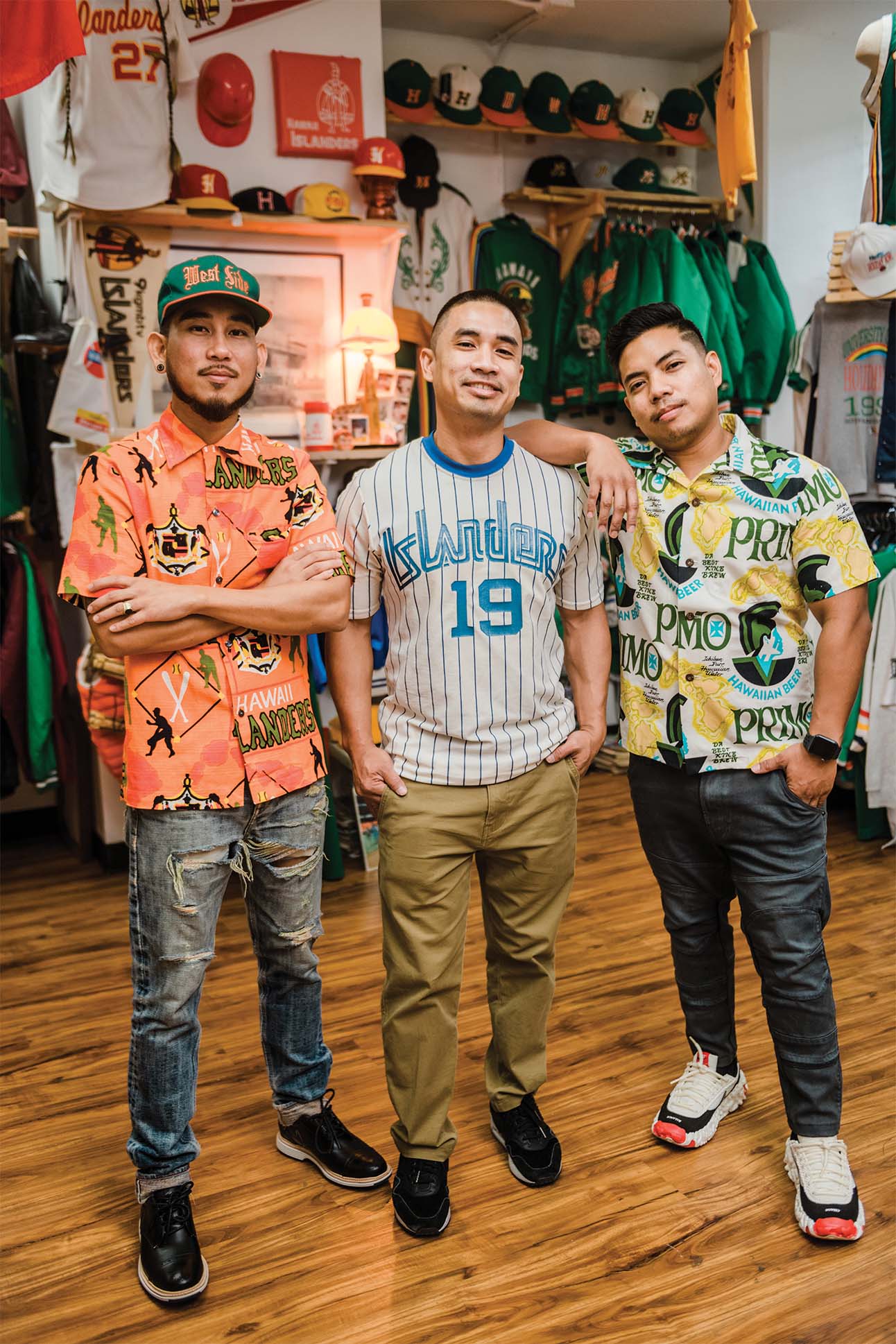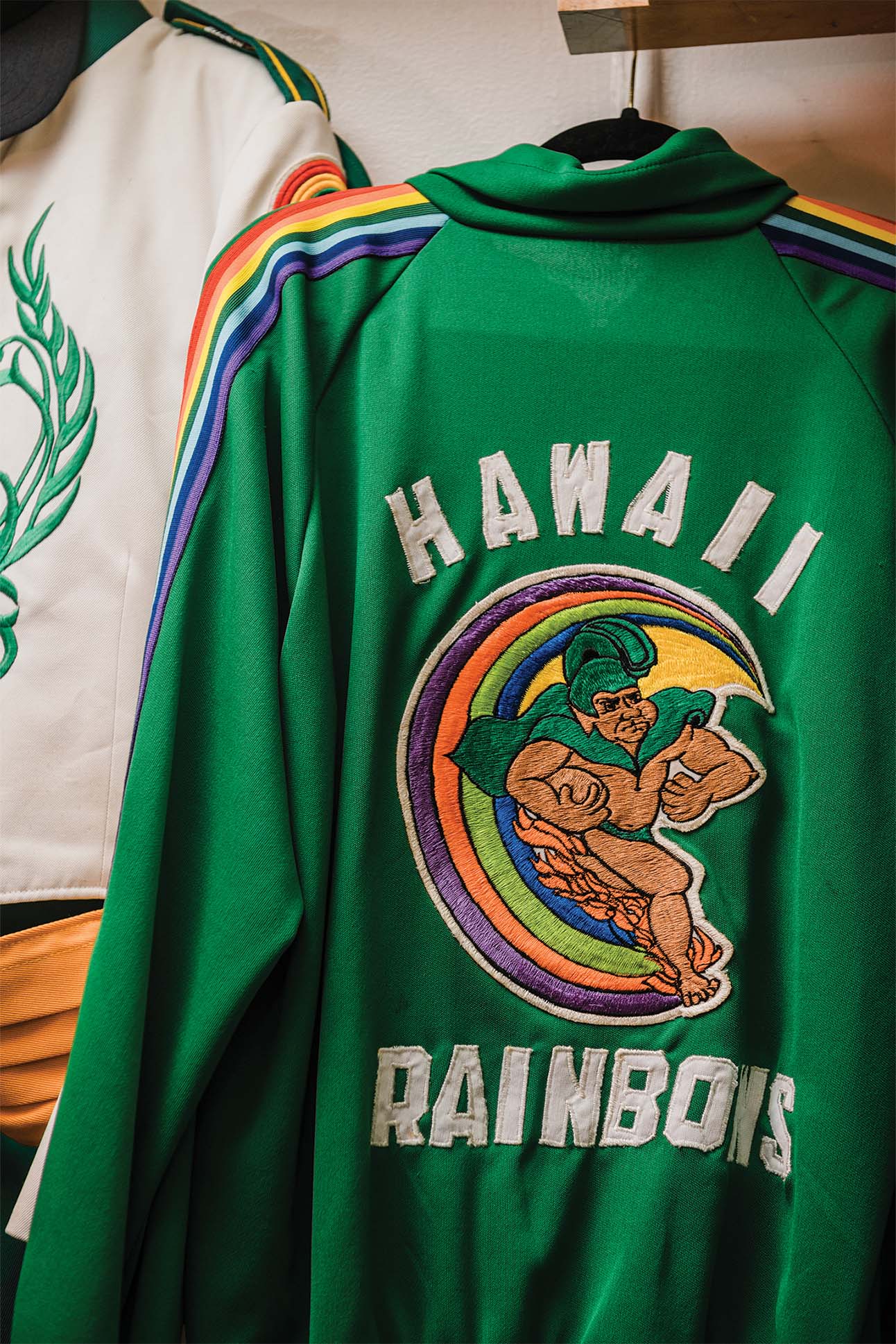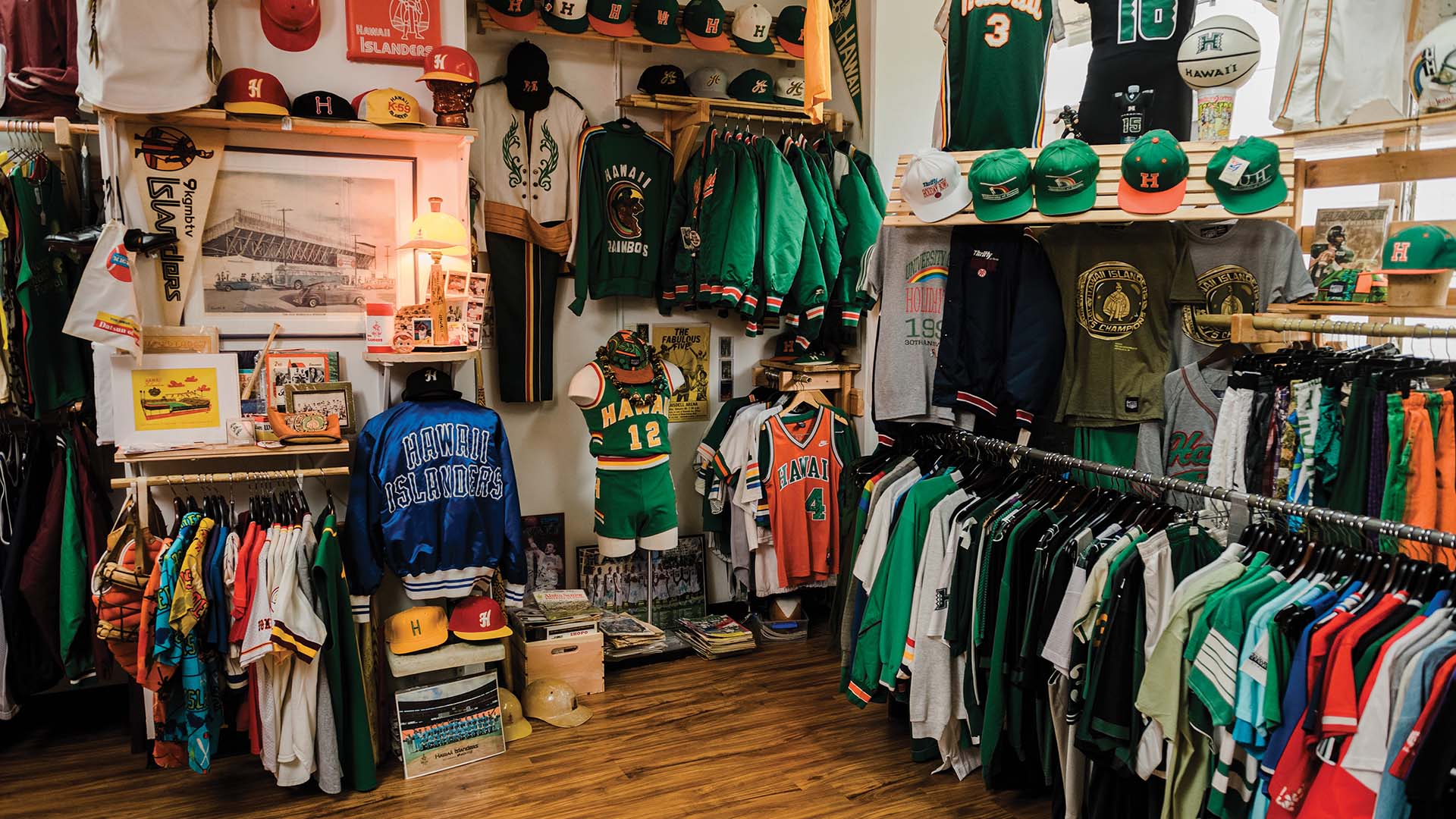At Old Queen Street Stadium, a blink- and-you’ll-miss-it vintage clothing store, the magic and magnetism of Hawai‘i’s local sports scene lives on.
Images by John Hook
Stepping through the doorway of Old Queen Street Stadium in Kaka‘ako is a bit like stepping through the wardrobe to Narnia, only if instead that closet led to an even bigger closet. The difference, though, is nonetheless transformative: It feels like every square inch of the shop’s dorm-sized space is used to showcase items dating back decades, ranging from high schools to the pros. Therein, all manner of memorabilia narrate different episodes in the story of island sports from the midcentury to now.
Most prevalently stocked are shirts, jerseys, hats and jackets with the funkified greens, oranges and rainbow logos representing teams from the University of Hawai‘i. The crown jewel is a gamer from legendary baseball coach Les Murakami, namesake of UH baseball’s home field, though the UH-themed WWE-style championship belt — one of only seven in the wild — is a scene-stealer. A little extra digging into Old Queen Street Stadium’s wares will also reveal pieces from the other four university athletic programs: the classic blues and whites of Hawai‘i Pacific University and Chaminade University, the bold blacks and reds of UH Hilo, and some splashes of crimson and gold from the now-sportsless BYU Hawai‘i.
The idea for the shop started out as a labor of love during the early days of the pandemic in 2020. A trio of Kalihi boys, Kevin Faller and brothers Chester and Kevin Sebastian, organized monthly pop-up events at a restaurant on Queen Street for vintage collectors and enthusiasts to meet up and ostensibly buy, sell, and trade with one another. But the real reason people kept turning up was to swap memories, sharing old stories and hearing new ones for the first time.


Many of the reminiscences at the pop-ups revolved around Honolulu Stadium, the bygone baseball-football field formerly located in Mō‘ili‘ili. Iconic in the minds and hearts of local sports fans, the multipurpose stadium was notorious for its 25,000 wooden-seat bleachers, which earned the nickname the Termite Palace for its frequent infestations. Before it was demolished in 1976, it hosted an incredible range of live events: national champion collegiate teams, local barefoot leagues, boxing matches, hula festivals, evangelical sermons and Elvis concerts. Renowned broadcaster and “The Voice” of UH Athletics Jim Leahey considered the stadium “part of the family,” calling it “the greatest babysitter in the world,” where parents could watch games while their kids played together in the field. Honolulu Stadium wasn’t just the epicenter of sports in Hawai‘i, it was the hub of city life and culture.
The name Old Queen Street Stadium is homage to both the restaurant that initially launched the founders’ vision and the type of collective they aspire to be. “We are the next stadium that brings communities together,” Faller says.




All three of the founders have full-time obligations outside of the shop. Kevin works at a T-Mobile store, Chester works at a law office, and Faller recently left a position as a program manager at the nonprofit KVIBE to take care of ailing family members. At KVIBE, Faller used bike meetups and cultural education to provide community and mentorship to kids in Kalihi. That ethos informs the mission of Old Queen Street Stadium. The jerseys and shirts are a means to get young kids through the door, Chester adds, explaining, “What you see on the walls is not just vintage clothing. What’s really on these things is stories.”
We’re an interactive museum. […] You can actually touch the clothes and know what it was like back then. You can feel the stories.
Kevin Faller
Some of the most unique pieces at Old Queen Street Stadium come from the state’s various short-lived forays into professional sports, like Team Hawaii (soccer), The Hawaiians (football), and even some rare finds from the Kona Navigators and Lahaina Whalers, baseball franchises that never became more than unfulfilled pipe dreams and premature merchandise.
The most expansive selection of professional gear belongs to Hawaii Winter Baseball, a professional league that ran for a total of eight seasons, composed of seven teams with names like the West Oahu Cane Fires and Waikiki Beach Boys. Hawaii Winter Baseball was home for top prospects from America and Asia during major league offseasons, with talented local players filling whatever spots were left on the limited rosters. Local fans got to see future greats like Jason Giambi, Buster Posey and Ichiro Suzuki before they were major league stars, but perhaps more meaningfully, they also got to see their uncles, cousins, and friends realize their dreams of becoming professional athletes.


Stick-and-ball sports comprise the bulk of the collection on display at the shop, but there are also gems for fans of local boxing, kickboxing, and mixed martial arts. Faller and the Sebastians make a point to stock more than athletic miscellany, too. The store is lined with aloha-wear uniforms, many of which are from now-defunct institutions like Aloha Airlines, Love’s Bakery, the Honolulu Star-Bulletin and, of course, the Termite Palace itself. By threading this category of apparel through their inventory, Old Queen Street Stadium transcends their sports-facing niche into a menagerie of working-class, everyday local life.
It’s why Faller and the Sebastians don’t see Old Queen Street Stadium as merely a store, even if most of the items are technically for sale. “We’re an interactive museum,” Kevin says. “You can actually touch the clothes and know what it was like back then. You can feel the stories.”
In the Hawaiian Islands, stories matter. The words for “story” and “genealogy” in ‘ōlelo Hawai‘i share the same root (mo‘olelo and moʻokūʻauhau, respectively); our stories are our lineage. “We’re trying to bring back intergenerational connections between kūpuna and keiki,” Faller says, likening their hybrid retail-archive space to what Honolulu Stadium did for past generations. “Stadiums are meant to bring people together.”


When people come together, special things happen, big and small. Ideas like aloha ‘āina and sustainable living — natural fits for people down to rock old, repurposed clothes — can take root and gain momentum. Kids see their parents and grandparents feel the electric buzz of nostalgia, and briefly glimpse who they were before adulthood.
This is especially true for the unsung “OGs” of Hawai‘i sports, people who didn’t appear on magazine covers or ESPN highlights. Athletes like wide receiver Leonard Lau, quarterback Michael Carter, and shortstop Mike DeKneef, local contenders who brought pride and excitement to fans for years but whose legacies have been overlooked and underappreciated.
“We do this for the people who aren’t well-known, because they should be known,” Faller says. “They may have played in the minor leagues, but it was major to them.”

